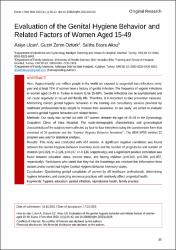| dc.contributor.author | Uzun, Asiye | |
| dc.contributor.author | Öztürk, Güzin Zeren | |
| dc.contributor.author | Aksu, Saliha Büşra | |
| dc.date.accessioned | 2022-04-29T08:55:42Z | |
| dc.date.available | 2022-04-29T08:55:42Z | |
| dc.date.issued | 2022 | en_US |
| dc.identifier.citation | Uzun, A., Öztürk, G. Z. ve Aksu, S. B. (2022). Evaluation of the genital hygiene behavior and related factors of women aged 15-49. Eurasian Journal of Family Medicine, 11(1), 35-42. https://doi.org/10.33880/ejfm.2022110105 | en_US |
| dc.identifier.issn | 0379-5284 | |
| dc.identifier.uri | https://doi.org/10.33880/ejfm.2022110105 | |
| dc.identifier.uri | https://hdl.handle.net/20.500.12511/9395 | |
| dc.description.abstract | Aim: Approximately one million people in the world are exposed to urogenital tract infections every year and at least 75% of women have a history of genital infection. The frequency of vaginal infections in women aged 15-49 in Turkey is known to be 35-68%. Genital infections can be asymptomatic and can cause negativity in sexual and family life. Therefore, it is important to take preventive measures. Mentioning correct genital hygiene behaviors in the training and consultancy services provided by healthcare professionals helps people to increase their awareness. In our study, we aimed to evaluate women's genital hygiene behaviors and related factors. Methods: Our study was carried out with 457 women between the ages of 15-49 in the Gynecology Outpatient Clinic of Nisa Hospital. The socio-demographic characteristics and gynecological characteristics of the subjects were collected by face-to-face interviews using the questionnaire form that consisted of 20 questions and the “Genital Hygiene Behavior Inventory”. The IBM SPSS version 22 program was used for statistical analysis. Results: This study was conducted with 457 women. A significant negative correlation was found between the Genital Hygiene Behavior Inventory score and the number of pregnancies and number of children (p=0.028, r=-0.128, p=0.037, r=-0.128, respectively), and a significant positive correlation was found between education status, income status, and having children (p=0.010, p=0.000, p=0.007, respectively). Participants who stated that they had the knowledge and received this information from doctors and/or nurses had higher Genital Hygiene Behavior Inventory scores. Conclusion: Questioning genital complaints of women by all healthcare professionals, determining hygiene behaviors, and correcting erroneous practices will positively affect urogenital health. | en_US |
| dc.language.iso | eng | en_US |
| dc.publisher | Eurasian Society of Family Medicine | en_US |
| dc.rights | info:eu-repo/semantics/openAccess | en_US |
| dc.subject | Education | en_US |
| dc.subject | Family Practice | en_US |
| dc.subject | Genital Infection | en_US |
| dc.subject | Hygiene | en_US |
| dc.subject | Reproductive Health | en_US |
| dc.title | Evaluation of the genital hygiene behavior and related factors of women aged 15-49 | en_US |
| dc.type | article | en_US |
| dc.relation.ispartof | Eurasian Journal of Family Medicine | en_US |
| dc.department | İstanbul Medipol Üniversitesi, Tıp Fakültesi, Cerrahi Tıp Bilimleri Bölümü, Kadın Hastalıkları ve Doğum Ana Bilim Dalı | en_US |
| dc.authorid | 0000- 0001-8322-6643 | en_US |
| dc.identifier.volume | 11 | en_US |
| dc.identifier.issue | 1 | en_US |
| dc.identifier.startpage | 35 | en_US |
| dc.identifier.endpage | 42 | en_US |
| dc.relation.publicationcategory | Makale - Uluslararası Hakemli Dergi - Kurum Öğretim Elemanı | en_US |
| dc.identifier.doi | 10.33880/ejfm.2022110105 | en_US |
| dc.institutionauthor | Uzun, Asiye | |
| dc.identifier.scopus | 2-s2.0-85128378563 | en_US |
| dc.identifier.trdizinid | 532516 | en_US |


















